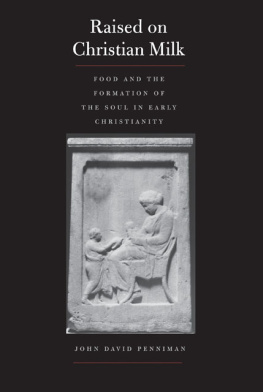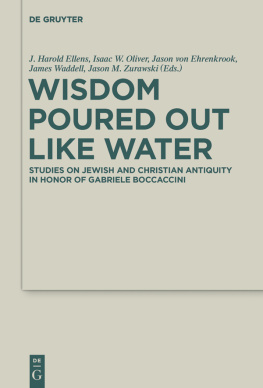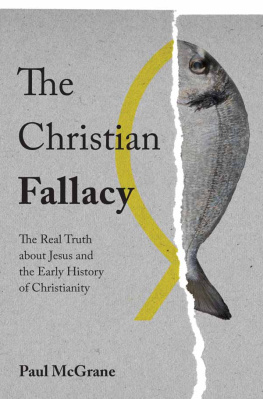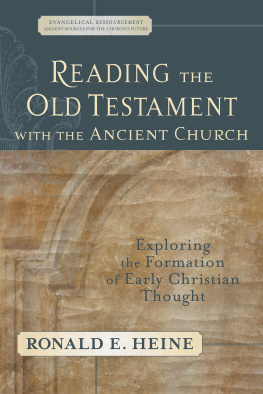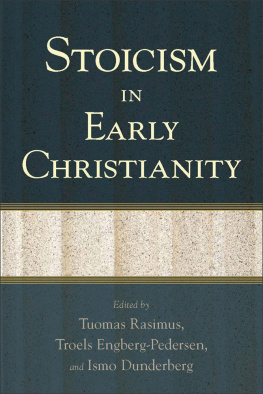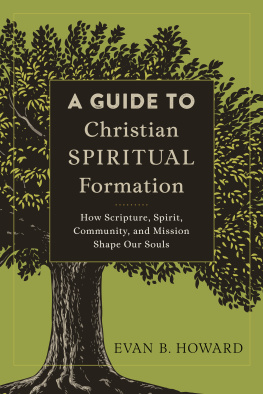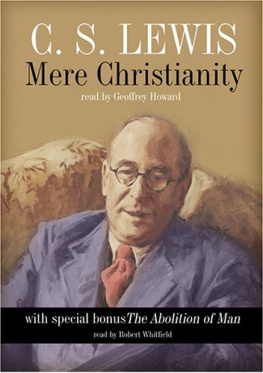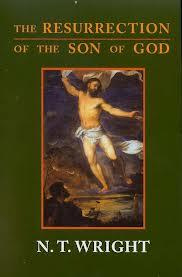Penniman - Raised on Christian Milk: Food and the Formation of the Soul in Early Christianity
Here you can read online Penniman - Raised on Christian Milk: Food and the Formation of the Soul in Early Christianity full text of the book (entire story) in english for free. Download pdf and epub, get meaning, cover and reviews about this ebook. City: New Haven;CT, year: 2018;2017, publisher: Yale University Press, genre: Romance novel. Description of the work, (preface) as well as reviews are available. Best literature library LitArk.com created for fans of good reading and offers a wide selection of genres:
Romance novel
Science fiction
Adventure
Detective
Science
History
Home and family
Prose
Art
Politics
Computer
Non-fiction
Religion
Business
Children
Humor
Choose a favorite category and find really read worthwhile books. Enjoy immersion in the world of imagination, feel the emotions of the characters or learn something new for yourself, make an fascinating discovery.
- Book:Raised on Christian Milk: Food and the Formation of the Soul in Early Christianity
- Author:
- Publisher:Yale University Press
- Genre:
- Year:2018;2017
- City:New Haven;CT
- Rating:3 / 5
- Favourites:Add to favourites
- Your mark:
- 60
- 1
- 2
- 3
- 4
- 5
Raised on Christian Milk: Food and the Formation of the Soul in Early Christianity: summary, description and annotation
We offer to read an annotation, description, summary or preface (depends on what the author of the book "Raised on Christian Milk: Food and the Formation of the Soul in Early Christianity" wrote himself). If you haven't found the necessary information about the book — write in the comments, we will try to find it.
Penniman: author's other books
Who wrote Raised on Christian Milk: Food and the Formation of the Soul in Early Christianity? Find out the surname, the name of the author of the book and a list of all author's works by series.
Raised on Christian Milk: Food and the Formation of the Soul in Early Christianity — read online for free the complete book (whole text) full work
Below is the text of the book, divided by pages. System saving the place of the last page read, allows you to conveniently read the book "Raised on Christian Milk: Food and the Formation of the Soul in Early Christianity" online for free, without having to search again every time where you left off. Put a bookmark, and you can go to the page where you finished reading at any time.
Font size:
Interval:
Bookmark:
Raised on Christian Milk
SYNKRISIS
Comparative Approaches to Early Christianity in Greco-Roman Culture
SERIES EDITORS
Dale B. Martin (Yale University) and L. L. Welborn (Fordham University)
Synkrisis is a project that invites scholars of early Christianity and the Greco-Roman world to collaborate toward the goal of rigorous comparison. Each volume in the series provides immersion in an aspect of Greco-Roman culture, so as to make possible a comparison of the controlling logics that emerge from the discourses of Greco-Roman and early Christian writers. In contrast to older history of religions approaches, which looked for similarities between religions in order to posit relations of influence and dependency, Synkrisis embraces a fuller conception of the complexities of culture, viewing Greco-Roman religions and early Christianity as members of a comparative class. The differential comparisons promoted by Synkrisis may serve to refine and correct the theoretical and historical models employed by scholars who seek to understand and interpret the Greco-Roman world. With its allusion to the rhetorical exercises of the Greco-Roman world, the series title recognizes that the comparative enterprise is a construction of the scholars mind and serves the scholars theoretical interests.
EDITORIAL BOARD
Loveday Alexander (Sheffield University)
John Bodel (Brown University)
Kimberly Bowes (University of Pennsylvania)
Daniel Boyarin (University of California, Berkeley)
Fritz Graf (Ohio State University)
Ronald F. Hock (University of Southern California)
Hans-Josef Klauck (University of Chicago)
Angela Standhartinger (Marburg University)
Stanley K. Stowers (Brown University)

Copyright 2017 by Yale University.
All rights reserved.
This book may not be reproduced, in whole or in part, including illustrations, in any form (beyond that copying permitted by Sections 107 and 108 of the U.S. Copyright Law and except by reviewers for the public press), without written permission from the publishers.
Chapter 5 originally appeared as Fed to Perfection: Mothers Milk, Roman Family Values, and the Transformation of the Soul in Gregory of Nyssa, Church History 84.3 (2015): 495530. Reprinted with permission.
Yale University Press books may be purchased in quantity for educational, business, or promotional use. For information, please e-mail
(U.S. office) or (U.K. office).
Set in Bulmer type by IDS Infotech, Ltd.
Printed in the United States of America.
Library of Congress Control Number: 2016950164
ISBN 978-0-300-22276-0 (hardcover : alk. paper)
A catalogue record for this book is available from the British Library.
This paper meets the requirements of ANSI/NISO Z39.48-1992 (Permanence of Paper).
10 9 8 7 6 5 4 3 2 1
To my family,
for teaching me to eat well
What is known of the moral effects of food? Is there a philosophy of nourishment?
Friedrich Nietzsche, The Gay Science
Contents
Preface
Each word has a life, its past, its ego, its self-esteem. It resists. It doesnt want to leave all this to the mercy of foreign handling, however reverential.
Kiki Dimoula, The Brazen Plagiarist
PINYTOS WAS HUNGRY. SO WAS HIS congregation. He had been feeding his flock the same lessons for a while. Milk can nourish only for so long. The folks on Knossos were growing restless, anxious for more substantial food. His teaching had become repetitive, uninteresting, weak. It seems that some in the community were ready for stronger nourishment, a meal that might enable them to progress toward deeper maturity in faith.
In book four of his Ecclesiastical History, Eusebius recounts the exchange between Pinytos, the bishop of Knossos, and Dionysius, the bishop of Corinth. For some reason, Dionysius had intervened in the affairs of the church at Knossos, recommending that Pinytos not place a heavy burden concerning compulsory chastity upon his community, but rather to set his sights on the weaknesses of the majority. It seems that the two bishops differed on how best to read the apostle Pauls teaching regarding marriage and chastity. Dionysius took the more flexible approach, suggesting that Pinytos be lenient in his lessons so as not to alienate anyone who shrinks from the rigors of chastity.
Pinytos became annoyed. A teacher ought not teach to the weakest pupils. The bar should be set higher. He turned to the apostle Pauls first letter to the Corinthians for support and found evidence there for the superiority of chastity over marriage. But Pinytos also discerned in Pauls writing a method for distinguishing the weak of faith from the strong, and a curricular paradigm for goading the former toward the latter. In his reply to the bishop of Corinth, Pinytos summoned Pauls words about nourishmentwords about breast milk and solid foodin order to pressure his Corinthian correspondent into giving an advanced lesson. Eusebius narrates: To [the letter from Dionysius] Pinytos replied that he admired and welcomed Dionysius, but petitioned him to distribute now already a more solid food, and to nourish the people under him with another more perfect letter, so that they might not be stuck feeding on milky words, and thus reach old age without noticing that they are still living as infants.
It is telling that Dionysius is described as the preparer and distributor of Pauls nourishment. When the apostle wrote to Corinth, he too had written in frustration. 1 Corinthians 3:13 attests to this. The Corinthians were weak and fleshly infants. They could not stomach anything more than what the apostle had already provided. His breast milk was the only food suitable for such souls. But in the second century, it seems that the milk-drinking infants of Corinth had finally outgrown their fleshly natures. And so Pinytos appealed to this legacy, seeking from Dionysius what the Corinthians had received from Paul: a stronger food that had the power to transform the one who eats it into the apostles fully grown, spiritualized ideal.
This second-century exchange between Pinytos and Dionysius, archived in the fourth century by Eusebius, is a window into the complex afterlife of Pauls words about milk and solid food. It reveals one disagreement among many others that would follow concerning the movement from milk to solid food and how best to understand the apostles discussion of growth from an infant faith to one of maturity. But it is interesting to me less as an accurate historical record of an epistolary exchange than as evidence for the enduring power of food to communicate the deepest values of early Christians. In the centuries that followed his correspondence to the Corinthians, Pauls reference to milk and solid food became an irresistible symbol. The disagreement between Dionysius and Pinytos about chastity being the higher teaching, the solid food, is merely one iteration of how that symbol was put to work in structuring Christian communities and organizing the people within them. Their debate reflects deeper tensions within early Christianity about the role of food in the proper formation of souls.
Words have weight, a density. They contain complex histories. The ghosts of their previous uses lurk behind the senses they acquire in the present. They function like oraclesinvoking pasts and imagining futures. Words also inescapably conjure the social and cultural realities of embodied life that invest them with meaning and power. The common vocabulary, tropes, and phrases we use to make sense of our world are never neutral. They bear witness to the ideologies, tensions, and anxieties that animate human life together. Such words are not simply abstract, merely metaphoric. They carry a formative power to mold, structure, and give shape to reality. What follows is a story about the weight, the histories, and the symbolic power of milk and solid food in early Christianity.
Next pageFont size:
Interval:
Bookmark:
Similar books «Raised on Christian Milk: Food and the Formation of the Soul in Early Christianity»
Look at similar books to Raised on Christian Milk: Food and the Formation of the Soul in Early Christianity. We have selected literature similar in name and meaning in the hope of providing readers with more options to find new, interesting, not yet read works.
Discussion, reviews of the book Raised on Christian Milk: Food and the Formation of the Soul in Early Christianity and just readers' own opinions. Leave your comments, write what you think about the work, its meaning or the main characters. Specify what exactly you liked and what you didn't like, and why you think so.

